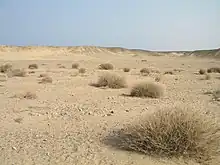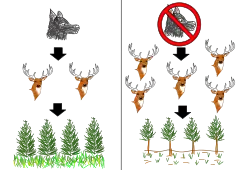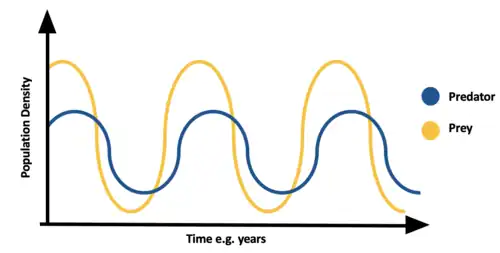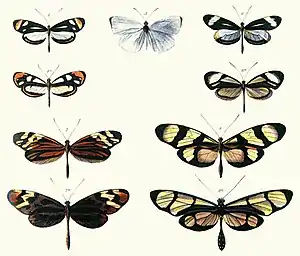| |
|
|
Ecology |
|
Ecology (from Ancient Greek οἶκος (oîkos) 'house', and -λογία (-logía) 'study of') is the study of the relationships among living organisms, including humans, and their physical environment. Ecology considers organisms at the individual, population, community, ecosystem, and biosphere level. Ecology overlaps with the closely related sciences of biogeography, evolutionary biology, genetics, ethology, and natural history. Ecology is a branch of biology, and is the study of abundance, biomass, and distribution of organisms in the context of the environment. It encompasses life processes, interactions, and adaptations; movement of materials and energy through living communities; successional development of ecosystems; cooperation, competition, and predation within and between species; and patterns of biodiversity and its effect on ecosystem processes. Ecology has practical applications in conservation biology, wetland management, natural resource management (agroecology, agriculture, forestry, agroforestry, fisheries, mining, tourism), urban planning (urban ecology), community health, economics, basic and applied science, and human social interaction (human ecology). The word ecology (German: Ökologie) was coined in 1866 by the German scientist Ernst Haeckel. The science of ecology as we know it today began with a group of American botanists in the 1890s. Evolutionary concepts relating to adaptation and natural selection are cornerstones of modern ecological theory. Ecosystems are dynamically interacting systems of organisms, the communities they make up, and the non-living (abiotic) components of their environment. Ecosystem processes, such as primary production, nutrient cycling, and niche construction, regulate the flux of energy and matter through an environment. Ecosystems have biophysical feedback mechanisms that moderate processes acting on living (biotic) and abiotic components of the planet. Ecosystems sustain life-supporting functions and provide ecosystem services like biomass production (food, fuel, fiber, and medicine), the regulation of climate, global biogeochemical cycles, water filtration, soil formation, erosion control, flood protection, and many other natural features of scientific, historical, economic, or intrinsic value. (Full article...) Selected article - A Przewalski's horse being released into the wild in Mongolia, as part of the Return of the Wild Horses project. Species reintroduction is the deliberate release of a species into the wild, from captivity or other areas where the organism is capable of survival. The goal of species reintroduction is to establish a healthy, genetically diverse, self-sustaining population to an area where it has been extirpated, or to augment an existing population. Species that may be eligible for reintroduction are typically threatened or endangered in the wild. However, reintroduction of a species can also be for pest control; for example, wolves being reintroduced to a wild area to curb an overpopulation of deer. Because reintroduction may involve returning native species to localities where they had been extirpated, some prefer the term "reestablishment". Humans have been reintroducing species for food and pest control for thousands of years. However, the practice of reintroducing for conservation is much younger, starting in the 20th century. (Full article...)Selected image -Sunflowers were domesticated by humans, and are native to Central America. The evidence thus far is that it was first domesticated in Mesoamerica|, present day Mexico, by at least 2600 BC. It may have been domesticated a second time in the middle Mississippi Valley, or been introduced there from Mexico at an early date, as maize was. Sunflower leaves can be used as a cattle feed, while the stems contain a fiber which may be used in paper production.
General imagesThe following are images from various ecology-related articles on Wikipedia.
Related WikiProjectsWikiProject Ecology
Things you can do
|
| “ | It is our collective and individual responsibility to protect and nurture the global family, to support its weaker members and to preserve and tend to the environment in which we all live. | ” |
| — Dalai Lama |
Ecology news
- April 23: European Union to reduce carbon emissions by 55% of 1990 levels by 2030
- November 27: Wikinews interviews Craig Farquharson, Liberal Democrat candidate for 2020 Groom by-election
- November 27: Wikinews interviews Sandra Jephcott, Sustainable Australia candidate for 2020 Groom by-election
- December 14: Greta Thunberg named 2019 Time Person of the Year
- November 23: Researchers break down deaths due to power plant pollution in the United States
- November 21: Slippery business: Materials scientists invent new coating for self-cleaning, water-efficient toilets
- October 19: Northern Arapaho Tribe welcomes buffalo herd in Wyoming, United States
- October 12: Scientists describe how 'upside-down rivers' of warm water break Antarctica's ice shelf
- October 5: Voracious fish defend coral reefs against warming, say scientists
- September 8: Scientists report skyrocketing phytoplankton population in aftermath of Kīlauea eruption
- November 5, 2009: "New ocean forming in African desert."
Selected publication -
Frontiers in Ecology and the Environment is a peer-reviewed scientific journal. It is published ten times per year by the Ecological Society of America and is its official journal. Its focus is on present day concerns pertaining to ecological and environmental issues. (Full article...)
Related portals
More did you know -
Related articles
Associated Wikimedia
The following Wikimedia Foundation sister projects provide more on this subject:
-
 Commons
Commons
Free media repository -
 Wikibooks
Wikibooks
Free textbooks and manuals -
 Wikidata
Wikidata
Free knowledge base -
 Wikinews
Wikinews
Free-content news -
 Wikiquote
Wikiquote
Collection of quotations -
 Wikisource
Wikisource
Free-content library -
 Wikiversity
Wikiversity
Free learning tools -
 Wiktionary
Wiktionary
Dictionary and thesaurus
Web resources
-
 List of all portals
List of all portals -

-

-

-

-

-

-

-

-

-
 Random portal
Random portal -
 WikiProject Portals
WikiProject Portals


_18.jpg.webp)




_peeking_from_a_leaf_hole_of_an_Alnus_nepalensis_tree_(cropped).jpg.webp)





.JPG.webp)



.jpg.webp)








.jpg.webp)